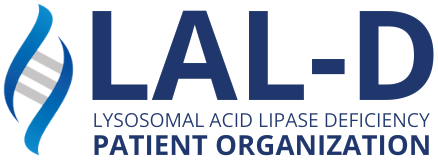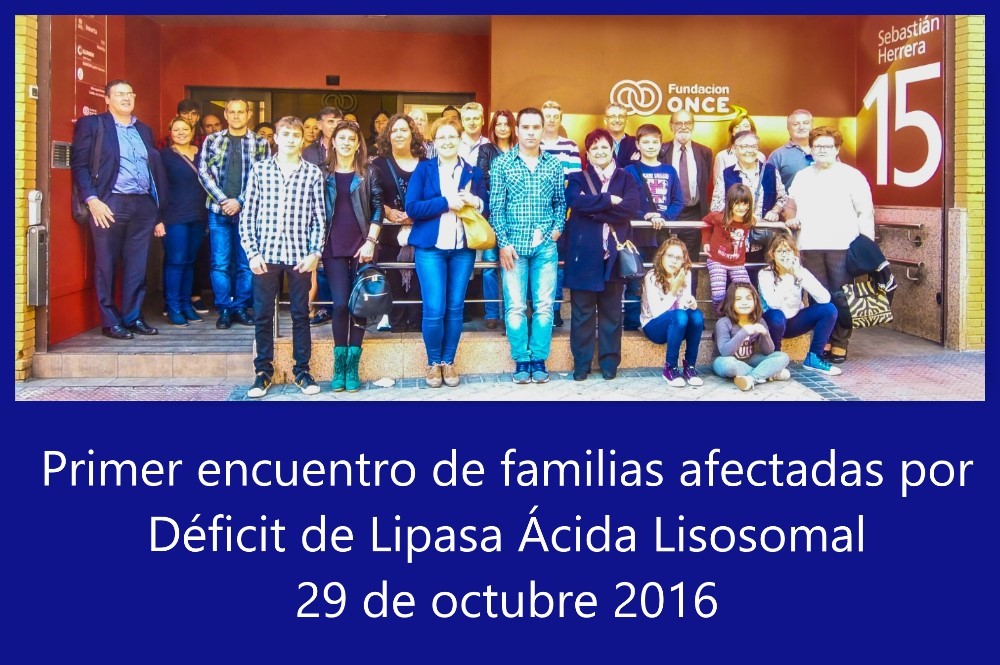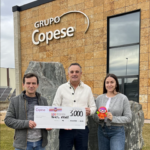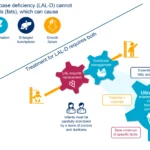This disease, considered ultra-rare and affecting 29 people in Spain, is also known as Wolman’s disease and Cholesterol Ester Storage Disease.
Lysosomal Acid Lipase Deficiency (LAL-D) is an autosomal recessive storage disease based on the accumulation of cholesterol esters and triglycerides in the cellular lysosome. This disease is characterized by multiorgan involvement, including the liver, spleen, cardiovascular system, and, to a certain extent, the gastrointestinal system. LAL-D can be differentiated into two phenotypes. One is Wolman’s disease, which affects infants and is fatal; death usually occurs within the first 12 months of life. Cholesterol Ester Storage Disease, the other phenotypic expression, manifests less rapidly and affects both children and young adults. Unfortunately, once symptoms develop, a significant percentage of patients may experience progression from liver fibrosis to cirrhosis or the need for a liver transplant within 3 years of symptom onset.
The frequency of the disease is still not fully known. Studies have reported various prevalence estimates, ranging from 1 in 130,000 to 1 in 300,000.
The Spanish Association for Lysosomal Acid Lipase Deficiency (AELALD) was founded in January 2015 by the parents of a 3-year-old girl diagnosed with this disease. The association’s purpose is to care for, unite, and provide guidance to affected individuals and their families, to promote widespread awareness in the diagnosis of new patients, and to promote research into the disease.
Being the only specific Association for this disease in Europe, its First Meeting of Affected Families was held in Madrid last Saturday, October 29, 2016, with the participation of specialists in the disease such as Dr. Carmen Camarena (Associate Physician at the Pediatric Hepatology Service, La Paz Hospital, Madrid), Dr. Emili Ros (Lipidologist and researcher at the Hospital Clínic of Barcelona, IDIBAPS and CIBEROBN), Dr. Pilar Giraldo (Translational Research Unit, Aragón Health Research Institute (IISAragón). U-752 CIBERER. Quirónsalud Hospital Zaragoza), Jorge Cebolla (Pre-Doctoral Researcher CIBERER. Spanish Foundation for the Study and Therapeutics of Gaucher Disease and other Lysosomal Diseases (FEETEG)), Francesc Cayuela (IT consultant linked to hospitals) and Mónica Rodríguez (Member of the Board of Directors of FEDER and President of the Spanish Sotos Syndrome Association). All of them shared their knowledge of this disease, which helped families and their patients gain greater knowledge and align their efforts to motivate themselves as a group to increase awareness, increase access to treatments, and motivate researchers to focus on this disease.
The only medication available for LAL-D is based on enzyme replacement therapy, providing what those affected lack. It was approved by the European Medicines Agency (EMA) in September 2015. In the coming months, its marketing must be approved or denied by the Ministry of Health. Considering the study conducted by the Spanish Association of Orphan and Ultra-Orphan Drug Laboratories (AELMHU) on access to these types of drugs in Spain compared to the most important European countries, it reveals a significant decrease in the number of Orphan Drugs (ODM) that have received funding and pricing from the public administration in the last four years. AELALD believes this is a key moment for all those affected.
For Eduardo López, President of AELALD, the importance of this congress lay in the opportunity to connect all affected patients and their families with the goal of creating a cohesive and coordinated advocacy group to further disseminate knowledge about this serious disease, support free access to treatment for all affected individuals, and, of course, seek to secure sufficient financial support to initiate lines of research that will lead to a cure for the disease in the coming years.
This was the event’s program: PROGRAM y CHILDREN’S PROGRAM




